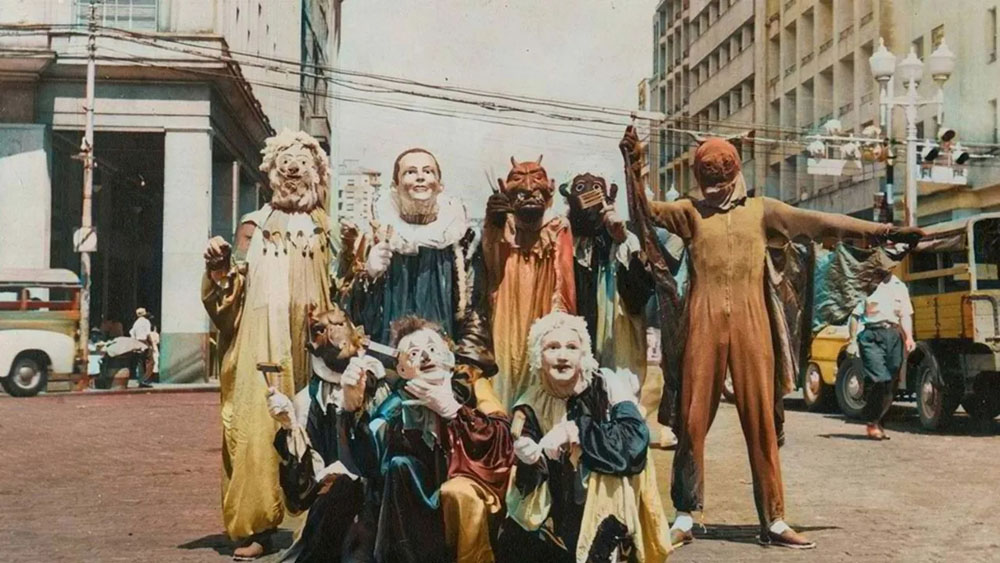In Neighboring Sounds (2012), Kleber Mendonça Filho's debut feature, the residents of a neighborhood in Recife, Brazil, are arrayed in a dense web of relations: A woman conceals illicit pleasures from her children and wages war with the howling dog next door. A real-estate broker shows units in luxury high-rises and takes his girlfriend to see her childhood home again before it is demolished. His ne'er-do-well cousin steals stereos out of parked cars. Meanwhile, a private security firm ostensibly keeps watch.
The neighborhood is Filho's own. The woman's apartment is the one in which he was raised by his own mother, and where he still lived at the time. That dog's wailing was for many years part of the soundtrack of his domestic world. Pictures of Ghosts (2023) is the director's backlot tour of the setting for many of his films and much of his life, segueing from his apartment to the cityscape of downtown Recife, in particular its old movie palaces, which are now mostly abandoned or remade as supermarkets and churches. Though the film is in part a cinephilic hymn, it is about the built environment more so than the projected image, about the vanishing sense of one's home more so than the escapism offered by the silver screen.
Filho began shooting the material that would become Pictures of Ghosts as a child, in his family's apartment, which served as the set for his first experiments with a camera. Some of the other footage comes from two documentaries he made as part of a graduation requirement for his journalism degree in the late 1980s and early 1990s, when he could already see the splendor of the trio of grand movie palaces standing across from each other along the Capibaribe River beginning to spoil. One sequence attests to the power of the theaters' marquees as timekeepers, visible in the background of so many photos taken on the Ponte Duarte Coelho bridge.
In one scene from Neighboring Sounds, the young couple mimes a box-office transaction in the concrete shell of an old cinema, retaken by nature. Some of the last of such transactions at the Art Palácio are captured by Filho's VHS camera in Ghosts. Expressive narration renders apparent his affinity for these ruined temples and for the street life of the downtown, since quieted by the relocation of the city's wealth to other areas. "I love downtown Recife," he avows, then explains he had cut and added that line back into the script twice for fear it was too earnest or obvious, finally reasoning that "You should tell someone when you like them." Filho does well to structure this film as an essay, not only a love letter, avoiding the most cloying sentiments. His memories are complicated, in some cases, by the project of historical excavation and recovery. The Art Palácio, he learns, was built in the 1930s as a cultural organ for the Nazi-controlled UFA, though shifting wartime priorities meant that it was never used for its intended purpose.
In one of Filho's short films, Cold Tropics (2009), Recife is speculatively subjected to a dreary microclimate, rendering its tourism economy unviable. The city, a narrator announces, "smells like the sea, fruits, and urine," a line that Filho reuses affectionately in Ghosts, attributing it to a friend. "Even before the climate changed," we hear, "Recife had already developed a paralyzing fear of violence and a taste for the ugly and aggressive urbanism common to Latin American cities. . . . Sections of Recife were turned into a landscape of straight lines and right angles: sterile and boring."
Filho has continued to take up this line of cultural and architectural critique with somewhat more subtlety. The security guards of Neighboring Sounds aren't much use to their supposed charges (their offer of protection is only a sublimated violence), but they do manage to help direct a lost, drunk foreigner back to his party in one or other of the indistinguishable high-rises which had come to dwarf Filho's two-story building. Forgettable cinemas, the director said after a recent screening, breed forgettable films. It stands to reason that forgettable homes would breed forgettable lives.
Not long ago, Filho and his family moved out of the old apartment after 40-some years. The final scene of Ghosts is a fictional coda featuring the director himself as the passenger in a hired car. I am still pondering the implications of the magical realist gesture therein. “It’s about strange things that happen at night in the city,” the director has said. To my eyes, it confounds the foregoing reminiscences somewhat, verging on that creeping conservatism abetted by nostalgia, an attitude that Filho tries to avoid but that is intrinsic to his subject. Isn’t it the fantasy of the modern consumer for the person rendering their services to become finally invisible, that they might partake of their luxury in solitude? And isn’t solitude that rarest of substances in a city, one which often must be bought, whether in the form of cab fare or a movie ticket?
Pictures of Ghosts screens this evening, October 10, and on October 12, at the New York Film Festival, its U.S. premiere. Tonight’s screening will be followed by a conversation with director Kleber Mendonça Filho.



